Last Updated on by Catherine Tobsing
Stephanie wrote:
Hello, I am hoping you can help me.
About three weeks ago I got a baby parakeet, I was told the bird was 10 weeks old.
The bird had black on its beak, and the cere was still purple in color.
I left the baby alone in the cage for a couple of days so it could adjust.
I did talk to Mason a lot softly.
After a couple of days I started putting my hand in the cage and leaving there while talking to the baby.
He/she was doing really well, but after 3 weeks the bird is suddenly acting skittish and trying to fly away from everything (his wings are clipped).
Even when I feed him he runs away. I don’t know what has happened.
I am also thinking he may be a she because the cere is turning brown around the edges.
I have an opportunity to get a handraised baby, but I want to know if it will upset this bird.
I just want this bird to be happy.
He/ she does play with toys, chirps sometimes.
I would understand if I couldn’t tame this bird. I just want him/her to be happy.
Would a handtamed bird be ok to put with Mason.
I love him and want what would make him/her happy.
Also would the hand tamed bird stay tame?
I lost my other parakeet a while ago and he was amazing.
He loved to be with my husband and I and would play and talk with us.
We were hoping to have another bird that wants to be with us.
Tinker, our other bird was amazing.
We want this little baby to be happy.
Thank you for your time. Stephanie
Name: Stephanie
to sfarrington74, Mitch
Dear Stephanie
When you brought the 10 week old bird home, was he also supposed to be hand tame?
A hand tame baby is not a bird that was not tame and then made to be tame, it is a baby bird that was separated from its parents (usually at about 2 weeks of age) and finished being fed by hand which causes them to become imprinted on humans and thus a better pet.
If it was fed by its parents until it left the nest box then it is likely to not become your friend.
It is normal for most birds, even hand tame ones to flee your hand if you stick it in the cage.
Unless it already attached to you, bonded and thus wants to be with you.
Otherwise, they will flee into their cage where they know it better than your big hand.
That it is clipped you could take it out and go to a small room (bathroom) and sit on the floor with it and let it climb on your hand, arm, etc.
Do you have any spray millet? That is a great food to use to encourage closeness. Cut a piece and let him nibble.
The cere may change once the bird matures revealing its true sex. We had a new baby we were told was a male. It looked like a female to us, but over time it indeed was a boy. And does that matter? A female can be as good a pet. American budgies are not big talkers so who cares what sex it is.
Now you are talking about getting another baby bird.
Was it tame the same as the other?
If so, what makes you feel this time it will not do the same?
And yes, birds of a feather flock together and you don’t have any feathers so the second budgie is going to be drawn to the first one.
What are your plans for the first budgie if you decide to go for the new baby?
We have been in your situation and the budgie really just wanted to spend time with the other budgie.
We let them have each other. In fact, to make them even more comfortable we added a couple more to the mix which made them all very happy.
Then added 2 more (yes, they are additive). All were foundlings, gifts or rescues.
We of course had to get a larger cage once we ended up with 6 parakeets.
You can see the exploits of our Budgie experience in our BLOG.
I hope this helps and you are able to enjoy your budgie(s).
Thank you
Hello,
I have an 8 yr old male parakeet named Tinker.
Recently I had noticed his right eye looked cloudy, so I took him to the vet and she said he had a cataract on his eye.
But otherwise he is healthy.
She said he looked awesome.
Hes an amazing bird, hes an amazing talker and a lovable boy. I want to know do I need to do anything to help him.
He seems to be adjusting well.
I haven’t changed out any of his toys since the vet visit.
I used to change them every couple of weeks except for his two favorite ones.
He does get upset and calls for us sometimes if we leave his sight for a bit when we have been home.
We let him out to play when we get home and play with him a lot.
Also should I keep his wings clipped? I want to make sure I am doing what will keep him happy and safe. We love him and want to make sure he is doing well.
Thank you. Stephanie
Hi Stephanie,
It sounds like your bird is generally happy and healthy
I’m assuming it’s a “budgie” when you say “parakeet”.
We love them we have six ourselves:-)
Please don’t stop changing the toys because all birds love the challenge and it helps keep them mentally active.
The problem with handicap birds is unlike humans they don’t know nor do they acknowledge their handicap.
Keeping Tinker’s wings clipped is a judgment call.
In that we don’t know how deteriorated the vision is in his right eye we don’t know how accurate his depth perception is.
I would advocate that you test for this by allowing the wings to grow slightly and launch Tinker by hand to landing zones that are close at first and begin moving away.
IE 1 foot then up to 6 feet over a couple of weeks
Make sure he has the ability to land on the perch placed for that very purpose.
If he begins to undershoot or overshoot the landing target you’ll know that clipping wings will keep him safer.
If his landings are right on, let them fly to his heart’s content but always watching to make sure his landings are accurate and safe.
Hope that helps
best
mitchr
Author Profile
Latest entries
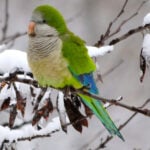 The Traveling BirdJune 26, 2025Can You Name 5 Parrot Species That Are Living Wild in the USA?
The Traveling BirdJune 26, 2025Can You Name 5 Parrot Species That Are Living Wild in the USA?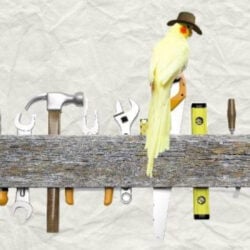 Bird BehaviorJune 26, 2025How is it Parrots Are Problem Solvers Social Animals and Even Use Tools?
Bird BehaviorJune 26, 2025How is it Parrots Are Problem Solvers Social Animals and Even Use Tools?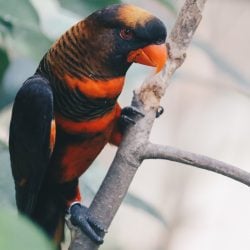 Bird & Parrot AnatomyJune 25, 2025How a Tiny Chemical Modification Makes Parrots Nature’s Living Paintings
Bird & Parrot AnatomyJune 25, 2025How a Tiny Chemical Modification Makes Parrots Nature’s Living Paintings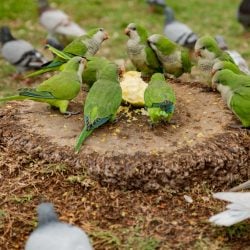 PigeonsJune 20, 2025How Do Parrots Thrive in Cities Outside Their Native Habitats?
PigeonsJune 20, 2025How Do Parrots Thrive in Cities Outside Their Native Habitats?



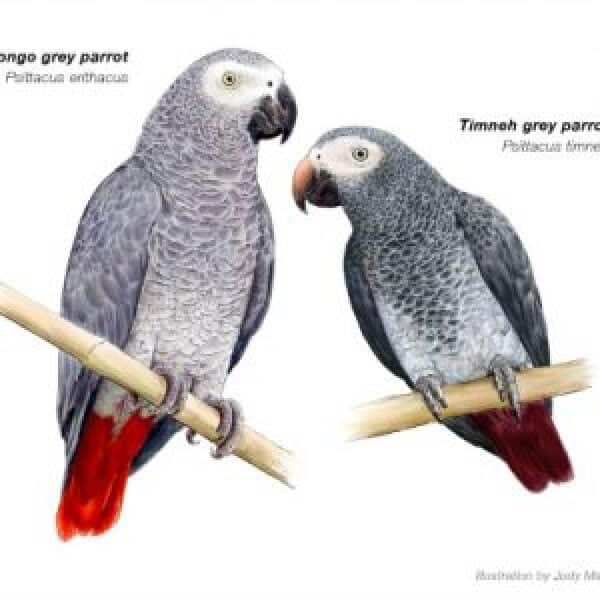

Andia Beukes
4 Nov 2018Hi my name is Andia
I have a 7-month-old lovebird, that I hand raised from about 2 months old. I do think it is a male. About 3 weeks ago he started to like ‘attack’ my hands (fingers). He will sit next to me, play on my desk or bed and just charge to my hands and start biting. I don’t know how to stop this behaviour, I don’t even know what caused it. It does look like he is showing signs of breeding behaviour.
He is a very fussy bird and lets you know if he doesn’t like it or what you give him. I do have suspicions that someone teases him while I am not home but why only go for my hands and not other people? Have any advice for me? Thank you.
WindyCityParrot
7 Nov 2018Hey Andia,
20% of hook bills are sexually dimorphic.
This means you can tell the sex of the bird by their color.
Green eclectus parrots are male, red eclectus parrots are female.
Male Indian ringneck’s have the ring.
Male gang-gang cockatoos have red feathered heads, the female’s heads are gray like the rest of their body.
Not so much with lovebirds, but nature gave us a super easy way to determine the sex of these lovely little creatures.
Offer your bird a square piece of newspaper or computer paper and wait till he or she starts chewing it.
If the bird makes strips and put some under their wing it is a female.
If the bird makes confetti, you’ve got a little boy.
That begins to help us make decisions on where to start.
In the meantime it’s important that you install full spectrum lighting no more than 6 inches over the bird cage.
The light must be set to a timer providing 12 hours of light and 12 hours of darkness.
The cage needs to be covered at night.
This will help synchronize your birds circadian rhythms.
The bird must wake up in the cage when the light comes on and be in the cage when the light goes off.
It is never acceptable to get bitten by a bird – ever.
I feel your pain, which is rescued a 15-year-old African ringneck.
He does not like hands nor skin.
I’ve taken my bites but I do everything I can to avoid them.
When it happens he is locked in his cage and gets the silent treatment.
I simply don’t acknowledge bad behavior but telling a bird that it’s a “bad bird” or “no bite” has zero effect because they don’t know the meaning of those terms.
You’ll also want to start on a daily regime of clicker training.
Five minutes a day 5 to 6 days a week will change the relationship with your bird because they will learn to be rewarded for positive behavior.
Let’s take these baby steps, then reach back out to me in a couple of weeks to see if we’ve made any progress.
If someone is teasing the bird, tell them to stop it.
They are causing stress to an innocent creature – the universe will turn on them.
best
mitchr